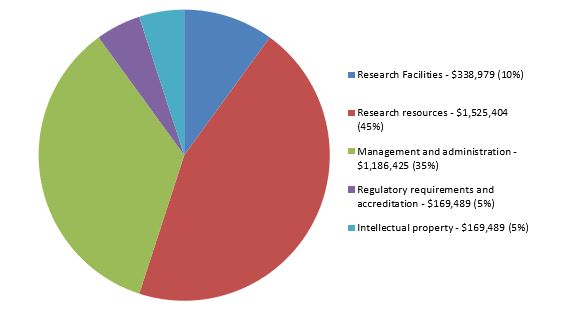Research Support Fund

The indirect costs of research are defined as the costs that are not attributed directly to a university research project, but which are real costs to the university. This includes the provision of office and laboratory space and their on-going operation and maintenance; insurance; library resources; the provision of research-related professional services such as project documentation, accounting and audit supervision, payroll, personnel and purchasing services; the support of research ethics, animal care, health and safety, and radiation, biohazards and environmental safety; and the provision of intellectual property protection and technology transfer services.
The Government of Canada invests in research excellence in the areas of health sciences, engineering, natural sciences, social sciences and humanities through its three granting agencies: the Natural Sciences and Engineering Research Council (NSERC), the Social Sciences and Humanities Research Council (SSHRC), and the Canadian Institutes of Health Research (CIHR).
The Research Support Fund (RSF), formerly the Indirect Costs Program, supports this research investment by helping Canadian postsecondary institutions, and their affiliated research hospitals and institutes, fund a portion of the indirect costs associated with this research. The grant funds are intended to support the indirect costs of research in the areas of research facilities, research resources, management and administration, regulatory requirements and accreditation, and intellectual property (the five categories of eligible expenses).
The Incremental Project Grant (IPG) is a stream of RSF. IPG provides further support for the indirect costs of research with a focus on priorities that cut across the five categories of eligible expenses. The four priority areas include: innovation and commercialization, facilities renewal, information resources, and equity, diversity and inclusion.
Research Security (RS) is a relatively new stream of RSF. RS is categorized as a fifth priority area of the IPG. RS funding provides support to activities related to the indirect costs of research security and to the National Security Guidelines for Research Partnerships. RS funding is intended to help build capacity within postsecondary institutions to identify, assess and mitigate the potential risks to research security.
UNB grant amounts
The RSF grant is based on the amount of funding institutions receive from the three federal research-granting agencies: NSERC, SSHRC and CIHR. The RSF grant formula takes the average of the three most recent years for which data are available. The IPG and RS grants are based on the RSF grant formula. The grants are awarded annually, and therefore institutions must re-apply every year to continue receiving funds.
2025-26 Research Support Fund Grant Amounts and Allocation
The allocation of the funds is as follows:
- UNB RSF: $3,389,786 allocated across the five categories of eligible expenses as per the below chart.
- UNB IPG: $181,997 allocated for resource support for agreements; Indigenous awareness, training and engagement; and modernization of research administrative support.
- UNB RS: $110,028 allocated toward the development and implementation of a research security framework.

UNB Performance objectives
UNB Reporting
*RSF, IPG and RS reporting is September of each year.
Performance Objectives Outcomes Report
- 2024-25 Performance Objectives Outcomes Report
- 2023-24 Performance Objectives Outcomes Report
- 2022-23 Performance Objectives Outcomes Report
- 2021-22 Performance Objectives Outcomes Report
- 2020-21 Performance Objectives Outcomes Report
Statement of Account
*Statement of accounts include RSF, IPG and RS grant amounts.
- 2024-25 Statement of Account
- 2023-24 Statement of Account
- 2022-23 Statement of Account
- 2021-22 Statement of Account
- 2020-21 Statement of Account
Specific to IPG and RS, the grant amounts and associated priorty areas are listed below.
| Year | Incremental Project Grant | Research Security |
|---|---|---|
| 2024-25 | $112,327 - Indigenizing research plus $28,933 - Indigenizing research & EDI resource support |
$107,169 - research risk due dilligence |
| 2023-24 | $107,210 – Indigenizing research | $107,138 – research risk due dilligence |
| 2022-23 | $76,529 – innovation and commercialization (policy) | $98,976 – resource development |
| 2021-22 | $104,803 – innovation and commercialization (policy) | N/A |
| 2020-21 | $40,002 – innovation and commercialization (policy) | N/A |
| 2019-20 | $42, 274 – innovation and commercialization (policy) | N/A |
How RSF helps UNB's research enterprise
Find stories that highlight support from the RSF on our research blog.
Previous years
Archived reports
- 2019-20 Performance Objectives Outcomes Report (revised October 2021)
- 2019-20 Statement of Account
- 2018-19 Performance Objectives Outcomes Report
- 2018-19 Statement of Account
- 2017-18 Performance Objectives Outcomes Report
- 2017-18 Statement of Account
- 2016-17 Performance Objectives Outcomes Report
- 2016-17 Statement of Account
- 2015-16 Performance Objectives Outcomes Report
- 2015-16 Statement of Account
- Overview of Government of Canada - Research Support Fund Program 2015-16
- 2014-15 Indirect Costs Outcomes Report
- 2013-14 Indirect Costs Outcomes Report
